
Our US Congress: Congress has passed 35 laws, almost none of which are the kind of thing you tout as a grand achievement when you're running for reelection, unless you're particularly jazzed about the "U.S. Wants to Compete for a World Expo Act" or the "Joint resolution providing for the appointment of Roger W. Ferguson as a citizen regent of the Board of Regents of the Smithsonian Institution." The most substantive things Congress has done are a series of bills passed under the Congressional Review Act, which allows them to nullify regulations promulgated by the president within a 60-day window. They used the CRA to undo a series of last-minute regulations from the Obama administration on things like dumping coal ash into streams (A-OK), employers keeping records of employee injuries (no longer necessary), and Internet service providers selling your browsing data without your permission (now they can).
Take health care. If you'll recall, passing the Affordable Care Act required a herculean effort from both the Obama White House and Democrats in Congress. It took an entire year, involved countless meetings and hearings and markups, and eventually passed without a single vote to spare. Republicans are trying to undo it not only without much help from the White House, but often with the president undermining them with his public comments. Just yesterday he tweeted "I suggest that we add more dollars to Healthcare and make it the best anywhere" at a moment when Republicans are trying to justify cutting hundreds of billions of dollars in health-care spending.
The other big item is tax reform, and as Richard Rubin of the Wall Street Journal reports today, "Republicans are scouring the tax code, searching for breaks to offset the deep rate cuts they desire. But the biggest tax breaks are surviving and the boldest ideas for change are on political life support or already dead." I've been arguing that in the end they'll probably just give up on comprehensive reform and strip it down to what they really want, which is a tax cut for the wealthy. That will be something, but not the big achievement they were hoping for.
One lesson here is that ambitious legislation requires both the president and Congress working together and being on their game, which isn't the case right now. But there's another problem, and perhaps a bigger one, that keeps Congress from passing buckets full of legislation.
There is the matter of distraction, as Congress is pulled into investigations and controversies. But more important, Congress can't just ignore what's going on in the White House and forge its own path because the fate of every member is tied to that of the president. An unpopular president beset by scandal makes members fear for their own seats, which encourages an every-person-for-themselves atmosphere. The less popular the president is, the more members look for ways they can show the voters back home that they're independent, which can mean bucking their own party leadership.
Hi! I am a robot. I just upvoted you! I found similar content that readers might be interested in:
https://www.washingtonpost.com/blogs/plum-line/wp/2017/05/29/why-cant-congress-get-its-act-together/
Downvoting a post can decrease pending rewards and make it less visible. Common reasons:
Submit